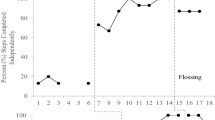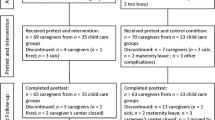Abstract
Caregivers of children with an autism spectrum disorder are often responsible for assisting their children to complete activities of daily living skills. Effective and efficient caregiver training methods are needed to train caregivers. The present study used two concurrent multiple-baseline across-participants designs to evaluate the effects of real-time feedback and behavioral skills training on training eight caregivers to implement teaching procedures for activities of daily living skills with their child. We assessed caregivers’ accuracy and correct implementation of the six-component teaching procedure after they received either real-time feedback or behavioral skills training. Caregivers from both groups mastered and maintained correct implementation of the teaching procedures with their child. The overall results suggest that real-time feedback and behavioral skills training are efficacious to train caregivers to implement activities of daily living skills procedures with their children, and that real-time feedback may be an efficient alternative method to train caregivers.


Similar content being viewed by others
References
American Psychiatric Association. (2013). Diagnostic and statistical manual of mental disorders: DSM-5. American Psychiatric Association.
Anderson, C. M., & McMillan, K. (2001). Parental use of escape extinction and differential reinforcement to treat food selectivity. Journal of Applied Behavior Analysis, 34(4), 511–515. https://doi.org/10.1901/jaba.2001.34-511.
Ausenhus, J. A., & Higgins, W. J. (2019). An evaluation of real-time feedback delivered via telehealth: Training staff to conduct preference assessments. Behavior Analysis in Practice, 12(3), 643–648. https://doi.org/10.1007/s40617-018-00326-1.
Bancroft, S. L., Weiss, J. S., Libby, M. E., & Ahearn, W. H. (2011). A comparison of procedural variations in teaching behavior chains: Manual guidance, trainer completion, and no completion of untrained steps. Journal of Applied Behavior Analysis, 44(3), 559–569. https://doi.org/10.1901/jaba.2011.44-559.
Carothers, D. E., & Taylor, R. L. (2004). How teachers and parents can work together to teach daily living skills to children with autism. Focus on Autism and Other Developmental Disabilities, 19(2), 102–104. https://doi.org/10.1177/10883576040190020501.
Carroll, R. A., Kodak, T., & Adolf, K. J. (2016). Effect of delayed reinforcement on skill acquisition during discrete-trial instruction: Implications for treatment-integrity errors in academic settings. Journal of Applied Behavior Analysis, 49(1), 176–181. https://doi.org/10.1002/jaba.268
Crockett, J. L., Fleming, R. K., Doepke, K. J., & Stevens, J. S. (2007). Parent training: acquisition and generalization of discrete trials teaching skills with parents of children with autism. Research in Developmental Disabilities, 28(1), 23–36. https://doi.org/10.1016/j.ridd.2005.10.003.
Demchak, M. (1990). Response prompting and fading methods: A review. American Journal on Mental Retardation, 94(6), 603–615.
Dogan, R. K., King, M. L., Fischetti, A. T., Lake, C. M., Mathews, T. L., & Warzak, W. J. (2017). Parent-implemented behavioral skills training of social skills. Journal of Applied Behavior Analysis, 50(4), 805–818. https://doi.org/10.1002/jaba.411.
Donnelly, M. G., & Karsten, A. M. (2017). Effects of programmed teaching errors on acquisition and durability of self-care skills. Journal of Applied Behavior Analysis, 50(3), 511–528. https://doi.org/10.1002/jaba.390.
Duncan, A. W., & Bishop, S. L. (2015). Understanding the gap between cognitive abilities and daily living skills in adolescents with autism spectrum disorders with average intelligence. Autism, 19(1), 64–72. https://doi.org/10.1177/1362361313510068.
Feldman, M. A., Case, L., Garrick, M., MacIntyre-Grande, W., Carnwell, J., & Sparks, B. (1992). Teaching child-care skills to mothers with developmental disabilities. Journal of Applied Behavior Analysis, 25(1), 205–215. https://doi.org/10.1901/jaba.1992.25-205.
Fisher, W., Piazza, C. C., Bowman, L. G., Hagopian, L. P., Owens, J. C., & Slevin, I. (1992). A comparison of two approaches for identifying reinforcers for persons with severe and profound disabilities. Journal of Applied Behavior Analysis, 25(2), 491–498. https://doi.org/10.1901/jaba.1992.25-491.
Ganz, M. L. (2007). The lifetime distribution of the incremental societal costs of autism. Archives of Pediatric and Adolescent Medicine, 161(4), 343–349. https://doi.org/10.1001/archpedi.161.4.343.
Grow, L. L., Carr, J. E., Gunby, K. V., Charania, S. M., Gonsalves, L., Ktaech, I. A., & Kisamore, A. N. (2009). Deviations from prescribed prompting procedures: Implications for treatment integrity. Journal of Behavioral Education, 18(2), 142–156. https://doi.org/10.1007/s10864-009-9085-6.
Gruber, D. J., & Poulson, C. L. (2016). Graduated guidance delivered by parents to teach yoga to children with developmental delays. Journal of Applied Behavior Analysis, 49(1), 193–198. https://doi.org/10.13023/ETD.2018.102.
Harrison, P. L., & Oakland, T. (2015). Adaptive Behavior Assessment System (3rd ed.). Western Psychological Services.
Hassan, M., Simpson, A., Danaher, K., Haesen, J., Makela, T., & Thomson, K. (2018). An evaluation of behavioral skills training for teaching caregivers how to support social skill development in their child with autism spectrum disorder. Journal of Autism and Developmental Disorders, 48(6), 1957–1970. https://doi.org/10.1007/s10803-017-3455-z.
Horner, R. D., & Keilitz, I. (1975). Training mentally retarded adolescents to brush their teeth. Journal of Applied Behavior Analysis, 8(3), 301–309. https://doi.org/10.1901/jaba.1975.8-301.
Kissel, R. C., Whitman, T. L., & Reid, D. H. (1983). An institutional staff training and self-management program for developing multiple self-care skills in severely profoundly retarded individuals. Journal of Applied Behavior Analysis, 16(4), 395–415. https://doi.org/10.1901/jaba.1983.16-395.
Lafasakis, M., & Sturmey, P. (2007). Training parent implementation of discrete-trial teaching: Effects on generalization of parent teaching and child correct responding. Journal of Applied Behavior Analysis, 40(4), 685–689. https://doi.org/10.1901/jaba.2007.685-689.
Lerman, D. L., LeBlanc, L. A., & Valentino, A. L. (2015). Evidence-based application of staff and caregiver training procedures. In H. S. Roane, J. E. Ringdahl, & T. S. Falcomata (Eds.), Clinical and organizational applications of applied behavior analysis (pp. 321–351). Elsevier.
Lerman, D. C., Swiezy, N., Perkins-Parks, S., & Roane, H. S. (2000). Skill acquisition in parents of children with developmental disabilities: interaction between skill type and instructional format. Research in Developmental Disabilities, 21(3), 183–196. https://doi.org/10.1016/S0891-4222(00)00033-0.
Libby, M. E., Weiss, J. S., Bancroft, S., & Ahearn, W. H. (2008). A comparison of most-to-least and least-to-most prompting on the acquisition of solitary play skills. Behavior Analysis in Practice, 1(1), 37–43. https://doi.org/10.1007/BF03391719.
MacDuff, G. S., Krantz, P. J., & McClannahan, L. E. (2001). Prompts and prompt-fading strategies for people with autism. In C. Maurice, G. Green, & R. M. Foxx (Eds.), Making a difference: Behavioral intervention for autism (pp. 37–50). Pro-Ed.
Matson, J. L., Hattier, M. A., & Belva, B. (2012). Treating adaptive living skills of persons with autism using applied behavior analysis: A review. Research in Autism Spectrum Disorders, 6(1), 271–276. https://doi.org/10.1016/j.rasd.2011.05.008.
Matson, J. L., Taras, M. E., Sevin, J. A., Love, S. R., & Fridley, D. (1990). Teaching self-help skills to autistic and mentally retarded children. Research in Developmental Disabilities, 11(4), 361–378. https://doi.org/10.1016/0891-4222(90)90023-2.
Miles, N. I., & Wilder, D. A. (2009). The effects of behavioral skills training on caregiver implementation of guided compliance. Journal of Applied Behavior Analysis, 42(2), 405–410. https://doi.org/10.1901/jaba.2009.42-405.
Miltenberger, R. G. (2012). Behavior modification: principles and procedures (5th ed.). Wadsworth Publishing.
Seiverling, L., Williams, K., Sturmey, P., & Hart, S. (2012). Effects of behavioral skills training on parental treatment of children’s food selectivity. Journal of Applied Behavior Analysis, 45(1), 197–203. https://doi.org/10.1901/jaba.2012.45-197.
Sewell, T. J., Collins, B. C., Hemmeter, M. L., & Schuster, J. W. (1998). Using simultaneous prompting within an activity-based format to teach dressing skills to preschoolers with developmental delays. Journal of Early Intervention, 21(2), 132–145. https://doi.org/10.1177/105381519802100206.
Shanley, J. R., & Niec, L. N. (2010). Coaching parents to change: the impact of in vivo feedback on parents’ acquisition of skills. Journal of Clinical Child and Adolescent Psychology, 39(2), 282–287. https://doi.org/10.1080/15374410903532627.
Slocum, S. K., & Tiger, J. H. (2011). An assessment of the efficiency of and child preference for forward and backward chaining. Journal of Applied Behavior Analysis, 44(4), 793–805. https://doi.org/10.1901/jaba.2011.44-793.
Squires, J., Twombly, E., Bricker, D., & Potter, L. (2009). Ages and stages questionnaires (Third ed.). Paul H. Brookes Publishing.
Wahler, R. G., Vigilante, V. A., & Strand, R. S. (2004). Generalization in a child’s oppositional behavior across home and school settings. Journal of Applied Behavior Analysis, 37(1), 43–51. https://doi.org/10.1002/jaba.206.
Walls, R. T., Zane, T., & Ellis, W. D. (1981). Forward and backward chaining, and whole task methods. Behavior Modification, 5(1), 61–74. https://doi.org/10.1177/014544558151005.
Ward-Horner, J., & Sturmey, P. (2012). Component analysis of behavior skills training in functional analysis. Behavioral Interventions, 27(2), 75–92. https://doi.org/10.1002/bin.1339.
Weiss, K. M. (1978). A comparison of forward and backward procedures for the acquisition of response chains in humans. Journal of the Experimental Analysis of Behavior, 29(2), 255–259. https://doi.org/10.1901/jeab.1978.29-255.
Funding
This study was partially funded by fellowship funds from the Buffett Early Childhood Institute Graduate Scholars Program at the University of Nebraska.
Author information
Authors and Affiliations
Corresponding author
Ethics declarations
Ethical approval
All procedures performed in studies involving human participants were in accordance with the ethical standards of the institutional and/or national research committee and with the 1964 Helsinki declaration and its later amendments or comparable ethical standards.
Informed consent
Informed consent was obtained from all participants included in the study.
Conflict of interest
The authors declare that they have no conflict of interest.
Additional information
Publisher’s Note
Springer Nature remains neutral with regard to jurisdictional claims in published maps and institutional affiliations.
This research was completed in partial fulfillment of the requirements for the doctoral degree of philosophy for Elizabeth J. Preas at the University of Nebraska Medical Center.
Research Highlights
• Real-time feedback may be an efficient alternative approach to train caregivers procedures to teach activities of daily living skills (ADLS).
• Providing behavior-specific feedback in the moment on each component of a teaching procedure can improve a caregiver’s performance of implementing ADLS immediately.
• As with previous research on behavioral skills training, this training is an effective approach to train caregivers ADLS teaching procedures and may allow caregivers more practice opportunities prior to implementing the procedures with their child.
• Caregivers may require training across multiple ADLS to demonstrate generalization of the ADLS teaching procedures to novel ADLS.
Supplementary Information
ESM 1
(DOCX 35.9 kb)
Rights and permissions
About this article
Cite this article
Preas, E.J., Mathews, T.L. Evaluation of Caregiver Training Procedures to Teach Activities of Daily Living Skills. Behav Analysis Practice 14, 958–973 (2021). https://doi.org/10.1007/s40617-020-00513-z
Accepted:
Published:
Issue Date:
DOI: https://doi.org/10.1007/s40617-020-00513-z




